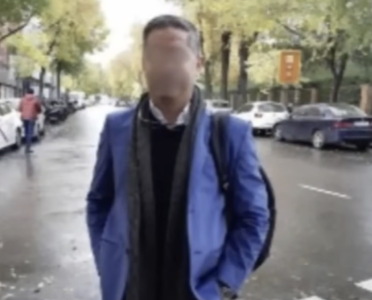Beware: This simple Facebook friend request mistake cost a woman $40K and her beloved pets—protect yourself now!
By
Veronica E.
- Replies 2
In today’s digital world, social media helps us stay connected with loved ones and even meet new friends. But sometimes, what seems like an innocent click can lead to devastating consequences.
This is exactly what happened to Kate Kleinert, a 69-year-old widow from Philadelphia, whose decision to accept a Facebook friend request turned into a heartbreaking ordeal—one that cost her not only $40,000 but also her home and six cherished dogs.
Here at The GrayVine, we believe awareness is the first step to protection. By learning from stories like Kate’s, we can all take steps to safeguard ourselves and our loved ones from online scams.
Understanding these risks can empower us to make safer choices online and help prevent similar tragedies.
It all started in August 2020 when Kleinert received a friend request from a man named Tony. Unlike other requests she ignored, this one felt different.
Tony introduced himself as a UN surgeon stationed in Iraq, a widowed father of two. His story resonated with Kleinert, who had also experienced profound loss.
Their online relationship quickly grew, with Tony painting a picture of love and companionship. He even had his “children” call Kleinert “Mom,” further deepening her trust.
But as time passed, certain details didn’t add up—his Facebook profile was sparse, and he always had an excuse to avoid video calls, claiming security concerns due to his work.
The first request seemed small—a $100 Visa gift card. But soon, Tony asked for more money to cover emergencies, business expenses, and legal fees. Wanting to help the man she believed she loved, Kleinert emptied her savings, her retirement funds, and even her late husband’s life insurance.
In total, she sent nearly $40,000—only to discover that Tony, his bank account, and even his lawyer were all elaborate fabrications.

As if the financial loss wasn’t enough, Kleinert’s situation took a devastating turn. A fire, caused by a faulty air conditioning unit she could no longer afford to replace, destroyed her home and tragically took the lives of her six beloved dogs.
Even in the wake of this heartbreaking loss, the scammer continued preying on her, asking for more money.
The man Kleinert knew as Tony was actually a 55-year-old scammer from Nigeria, using stolen photos of a real surgeon.
The emotional and financial toll was immense, but Kleinert found the courage to turn to law enforcement and begin rebuilding her life.

Unfortunately, online scams—especially romance scams—are on the rise, with over $1.14 billion in reported losses in 2023 alone. Here’s how you can protect yourself:
Kleinert now works with AARP’s Fraud Watch Helpline, sharing her story to help protect others from falling into the same trap.
By spreading awareness and staying informed, we can all play a role in keeping our community safe and ensuring that no one has to endure such a devastating experience.

Have you or someone you know encountered an online scam? What steps do you take to stay safe online? Share your thoughts in the comments below, and if you found this article helpful, be sure to like and share! Together, we can stay vigilant and protect ourselves from digital deception.
Also read: The FBI just revealed two words that signal you're being scammed—find out now!
This is exactly what happened to Kate Kleinert, a 69-year-old widow from Philadelphia, whose decision to accept a Facebook friend request turned into a heartbreaking ordeal—one that cost her not only $40,000 but also her home and six cherished dogs.
Here at The GrayVine, we believe awareness is the first step to protection. By learning from stories like Kate’s, we can all take steps to safeguard ourselves and our loved ones from online scams.
Understanding these risks can empower us to make safer choices online and help prevent similar tragedies.
The Deceptive Digital Romance
It all started in August 2020 when Kleinert received a friend request from a man named Tony. Unlike other requests she ignored, this one felt different.
Tony introduced himself as a UN surgeon stationed in Iraq, a widowed father of two. His story resonated with Kleinert, who had also experienced profound loss.
Their online relationship quickly grew, with Tony painting a picture of love and companionship. He even had his “children” call Kleinert “Mom,” further deepening her trust.
But as time passed, certain details didn’t add up—his Facebook profile was sparse, and he always had an excuse to avoid video calls, claiming security concerns due to his work.
The Financial Abyss
The first request seemed small—a $100 Visa gift card. But soon, Tony asked for more money to cover emergencies, business expenses, and legal fees. Wanting to help the man she believed she loved, Kleinert emptied her savings, her retirement funds, and even her late husband’s life insurance.
In total, she sent nearly $40,000—only to discover that Tony, his bank account, and even his lawyer were all elaborate fabrications.

Tony, the man who deceived Kate, using a stolen photo to manipulate her trust. Image Source: YouTube / Tamron Hall Show.
The Tragic Outcome
As if the financial loss wasn’t enough, Kleinert’s situation took a devastating turn. A fire, caused by a faulty air conditioning unit she could no longer afford to replace, destroyed her home and tragically took the lives of her six beloved dogs.
Even in the wake of this heartbreaking loss, the scammer continued preying on her, asking for more money.
The Harsh Reality
The man Kleinert knew as Tony was actually a 55-year-old scammer from Nigeria, using stolen photos of a real surgeon.
The emotional and financial toll was immense, but Kleinert found the courage to turn to law enforcement and begin rebuilding her life.

To add to the heartbreak, a fire on July 22 destroyed Kate Kleinert's home and claimed the lives of her six dogs. Image Source: YouTube / Tamron Hall Show.
Protecting Yourself from Scams
Unfortunately, online scams—especially romance scams—are on the rise, with over $1.14 billion in reported losses in 2023 alone. Here’s how you can protect yourself:
- Be cautious when accepting friend requests from strangers. Look for inconsistencies in their profile and stories.
- Never send money or personal information to someone you’ve only met online.
- Do a reverse image search of their photos to verify their identity.
- Regularly review your privacy settings to control who can see your information.
- If you suspect a scam, report it to the authorities, such as the FBI’s Internet Crime Complaint Center (IC3).
Kleinert now works with AARP’s Fraud Watch Helpline, sharing her story to help protect others from falling into the same trap.
By spreading awareness and staying informed, we can all play a role in keeping our community safe and ensuring that no one has to endure such a devastating experience.
Key Takeaways
- A 69-year-old widow named Kate Kleinert from Philadelphia, Pennsylvania, was scammed out of $40,000 after befriending a man on Facebook who claimed to be a surgeon working in Iraq.
- The scammer, who used a fake identity, manipulated Kleinert into sending him money for various fabricated reasons, including alleged emergencies and travel expenses.
- Kleinert's tragic experience culminated in a fire that destroyed her home and resulted in the death of her six dogs, leaving her to rebuild her life with the help of AARP’s Fraud Watch Helpline.
- Experts from the FBI and cybersecurity firms stress the importance of being vigilant against romance scams and urge victims to report such incidents to authorities, such as the FBI’s Internet Crime Complaint Center (IC3).
Have you or someone you know encountered an online scam? What steps do you take to stay safe online? Share your thoughts in the comments below, and if you found this article helpful, be sure to like and share! Together, we can stay vigilant and protect ourselves from digital deception.
Also read: The FBI just revealed two words that signal you're being scammed—find out now!







